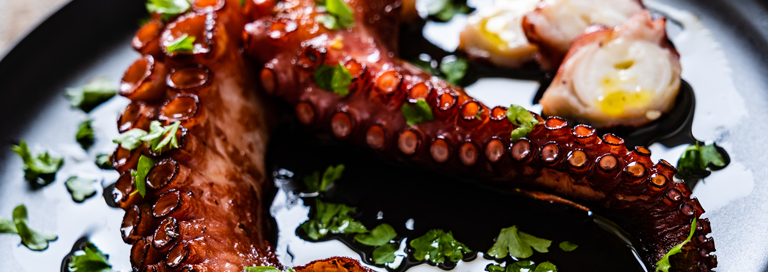East Asian cultures are known for their incredible longevity. In fact, they outlive people in almost every other part of the world.
But they don’t just live longer. They remain healthier longer – and have far fewer chronic diseases than the Western world. In fact, East Asian cultures continue to be active and engaged well into their 80s and beyond.
As an anti-aging doctor, I want to bring as many of these health secrets to our shores as possible.
line -->So when I see communities like those in Japan or South Korea remaining energetic and vital for so long, my first reaction is always the same… Look at their diet.
The East Asian diet is packed with all beneficial foods, but one stands out – octopus.
While many Americans love seafood, octopus isn’t usually the first choice. But it should be.
Eat raw and cooked; octopus is packed with a long list of super nutrients, including a generous amount of vitamin B12.
This could be a big reason why these cultures remain as healthy as they are. And why they don’t have to worry about cognitive decline as much as we do.
Taken in the proper amounts, it can support and protect a sound mind well into old age. And that means keeping your freedom and independence well into your golden years…
Avoid the danger of deficiency
Unfortunately, it’s easy to see what happens when you don’t get enough vitamin B12.
Tufts University researchers examined data from over 500 men and women, dividing participants into groups based on vitamin B12 levels.
Those with the lowest scores were at the highest risk for developing accelerated cognitive decline. The results were published in The Journal of the American Geriatrics Society.1
Researchers also found that it doesn’t take long for vitamin B12 deficiencies to do damage. In a study of young children, participants with poor vitamin B12 levels struggled the most with cognitive tests such as puzzles, letter recognition, and interpreting emotions in other children.2
Vitamin B12 is beyond essential. It is vital for maintaining memory, energy, and focus and plays a pivotal role in protecting you from many chronic diseases and conditions.
I consider vitamin B12 to be nature’s whole-body “medicine.” Too little results in:
-
- Fatigue, weakness, and low energy
- Low bone mineral density leading to osteoporosis
- Macular degeneration
- Depression
- Heart disease from high homocysteine levels
- Memory loss and dementia
3 easy ways to get more B12 in your diet
Vitamin B12 is not something your body can make by itself. Humans have developed to consume it from animal sources.
But it isn’t surprising that vitamin B12 deficiencies are widespread in the West. Our medical establishment discourages us from consuming the best sources of B12. I’m talking about organ meat and other animal proteins.
Here are the best ways to get vitamin B12 in today’s modern world.
-
- Eat more animal protein. First, ignore all the anti-animal propaganda coming from the modern medical establishment. If octopus isn’t for you, you can still get a heaping helping of vitamin B12 from other animal sources. Seafood, including clams, trout, salmon, and tuna, is also a good source. But your best bet is to eat grass-fed organ meats from beef and lamb, especially liver and kidneys.
- Don’t forget nature’s perfect food. I don’t think I’ll ever run out of good things to say about eggs. Not only are they a great source of protein and several other vitamins and nutrients, but they’re also a fantastic source of vitamin B12. But you have to eat the whole thing…most of the nutrients come from the yolk.
- Supplement to make up what you need. Big Agra’s diminished food quality makes it almost impossible to get what you need from food sources alone. Most nutritionists say adults only need 2.4 micrograms (mcg) per day. That’s way too low. I recommend a minimum of 100 mcg per day. But I advise many patients to take as much as 2,000 mcg per day. But pay attention to what you’re taking… Many drug store supplements contain cyanocobalamin – an artificial, man-made form of B12. Your body excretes this artificial form three times faster than natural B12. So it may disappear before your body has a chance to use it. You can find vitamin B12 supplements in capsules and patches, but I recommend a spray. It’s the most effective way to get the nutrient into your bloodstream. Capillaries and small blood vessels in your mouth quickly absorb the mist. Sprays also bypass the gut, where your B12 absorption may be low.
- Get the shot. Here at the Sears Institute for Anti-Aging Medicine, I offer intravenous B12 injections. The shots are a good option if you have trouble absorbing B12. They bypass the gut and go directly into the bloodstream. If you’d like to schedule and appointment for B12 injections, please call my staff at (561)784-7852 to get the details. They’re happy to assist you.
To Your Good Health,

Al Sears, MD, CNS
References:
1. Morris M, et al. “Vitamin B-12 and folate status in relation to declining in scores on the mini-mental state examination in the Framingham Heart Study.” J Am Geriatr. 2012;60(8):1457-1464
2. Kvestad I, et al. “Vitamin B-12 status in infancy is positively associated with development and cognitive functioning 5 y later in Nepalese children.” Am J Clin Nutr. 2017;105(5):1122-1131

